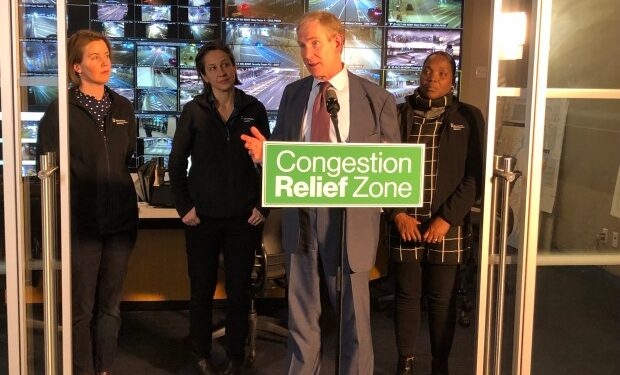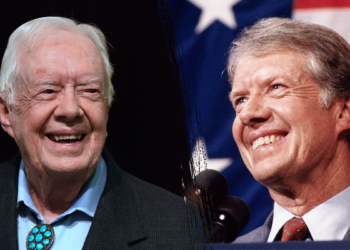Congestion pricing in NYC is heading toward a planned Sunday morning start after a federal judge in Newark denied New Jersey Gov. Phil Murphy’s last minute motion for a temporary injunction to stop the toll.
Friday’s ruling removes what is likely the final obstacle to congestion tolling’s planned Sunday start, though New Jersey’s lawyer, Randy Mastro, said after the ruling he would seek an emergency appeal Friday night or Saturday morning at the Third Circuit Court of Appeals in Philadelphia.
“We will continue on behalf of the state of New Jersey to do everything we can to stop congestion pricing from going forward before this remand,” he said.
That possibility notwithstanding, beginning after midnight Jan. 5, drivers will be automatically tolled when the drive on Manhattan surface streets at 60th Street or below, paying a base toll of $9 to enter the congestion zone.
“We’ve been studying this issue for five years, but it only takes about five minutes if you’re in midtown Manhattan, to see that New York has a real traffic problem,” said MTA chariman Janno Lieber in praising the ruling.

Judge Leo Gordon made the ruling from the bench late Friday night, after attorneys for the Garden State sought to clarify his Monday ruling in New Jersey’s long-running suit seeking to stop the toll. The Murphy administration’s suit — the most serious challenge to New York’s plan to toll drivers entering Midtown and lower Manhattan — argues that changing traffic patterns from trucks and other vehicles seeking to avoid the toll will unfairly impact the air quality in New Jersey.

In his Monday ruling, Gordon had issued a “remand in part” of the Federal Highway Administration’s approval of congestion tolling. The judge ordered the feds to account for why New York’s congestion pricing plan detailed specific pollution mitigations for the Bronx, but failed to detail such plans for several New Jersey towns — even though both regions are expected to see an increase in motor vehicle traffic.
During Friday’s hearing in Newark, MTA attorney Elizabeth Knauer said there was $9.8 million in mitigation funds earmarked for New Jersey communities since the June evaluation by the highway administration that would be rolled out over five years.
“There was always a commitment to provide mitigation to communities in New Jersey that warranted it,” she said.
But Mastro, the well-known litigator representing New Jersey, said residents of the Garden State are going to suffer and told the judge: “You’re the last line of defense and you already recognized that they got it wrong.”
The judge’s ruling earlier this week sparked confusion as both sides declared victory.
Gov. Hochul and Lieber both said the tolling plan would continue, as the ruling included no language requiring them to stop while the feds answered Gordon’s concerns.
But the Garden State said the ruling should stop the toll in its tracks. Attorneys for New Jersey argued that even a partial remand meant the program was no longer authorized by federal regulators, and that a lack of clarity regarding pollution mitigation should in and of itself be enough to order a temporary pause on the program.

“The irreparable harm that New Jersey will suffer once the MTA flips the switch on congestion pricing is manifest,” the Garden State’s lawyers wrote earlier this week in seeking an injunction against a Sunday start. “Beginning on Day One, New Jersey will experience vehicle traffic increases and poorer air quality.”
After four hours of closed-door deliberation Friday evening, Gordon said that his ruling was never intended to block the tolling program, and that he was not tossing the federally approved environmental studies backing congestion pricing.
“The court will be be clear that the court did not vacate the [environmental assessment] or the [finding of no significant environmental impact,]” Gordon said.
Mastro, representing New Jersey, tried one last time to stop the toll after Gordon denied the injunction, asking for a temporary pause in order to appeal to the higher Third Circuit court.
“I respectfully request you give us five days to allow the third circuit to take up the issue,” Mastro said.
Gordon denied the request.
Outside the Newark courthouse, Mastro reiterated his intent to appeal to the Third Circuit in Philadelphia.
“If we can get there tonight, we will file our emergency appeal papers tonight — otherwise we’ll file them first thing tomorrow morning,” he said.
Lieber welcomed news of the court victory Friday at a press conference in the transit agency’s downtown headquarters.
“Earlier this week, Judge Gordon in New Jersey rejected that state’s claim that the environmental assessment — the 4000 page document reflecting five years of work that had been approved by the federal government — was deficient in some way,” he said. “Today, the judge confirmed that ruling and denied New Jersey’s effort to get an injunction to stop congestion pricing from starting tomorrow night.”
New York’s congestion tolling plan, mandated by law in 2019, is meant to reduce traffic in Midtown and lower Manhattan while raising funds for the MTA’s capital budget.
Revenue from the toll is intended to back $15 billion in bonds issued by the MTA, which will in turn fund a bevy of construction and repair projects around the city’s transit network.
The toll had been set to go into effect last summer, before Gov. Hochul paused the plan three weeks before it was to start, ultimately waiting until November to re-start it at a lower initial cost to drivers.
Originally Published:







